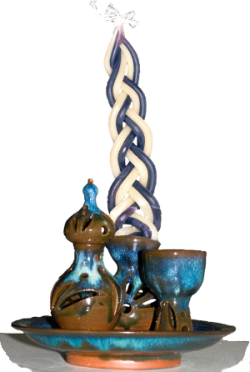ICJudaism: A Teacher’s Guide to Judaism
Hosted by ICTeachers Formerly: Mike’s Rough Guide to Judaism
Disclaimer:
The contents of these pages represent the author’s personal views, experience and
understanding.
There are bound to be some things here that some Jews would disagree
with.
Shabbat 4
After synagogue, the rest of the day will be spent at home. There will be lunch (usually cold, since the food will have been prepared before Shabbat began, although there are some traditional slow cooked stews that can be started before Shabbat and left to slow cook overnight) and a quiet afternoon of family time. In many Jewish households the TV, radio, computers, mobile phones and games consoles will be left switched off throughout Shabbat and the telephone will go unanswered.
As evening draws on Shabbat is ended with a simple ceremony called Havdalah (meaning
separation). Havdalah begins with a blessing said over a cup of wine. A box of sweet
smelling spices (often cloves and cinnamon) is passed round for everyone to smell.
A plaited candle with more than one wick is lit -
In many families Havdalah is delayed until an hour after dark -

After Havdalah, it is common for each family member to add a small amount of money to a Tzadakah (Charity) box which, when full, will be donated to a chosen charity.
A Havdalah “set” consisting of a candle holder (with Havdalah candle, a wine cup and a spice box).
